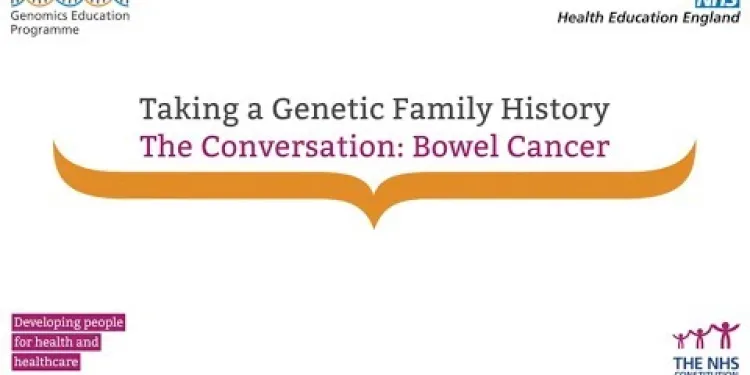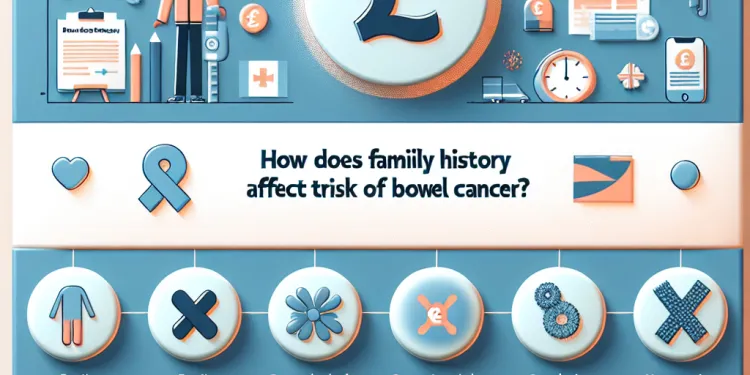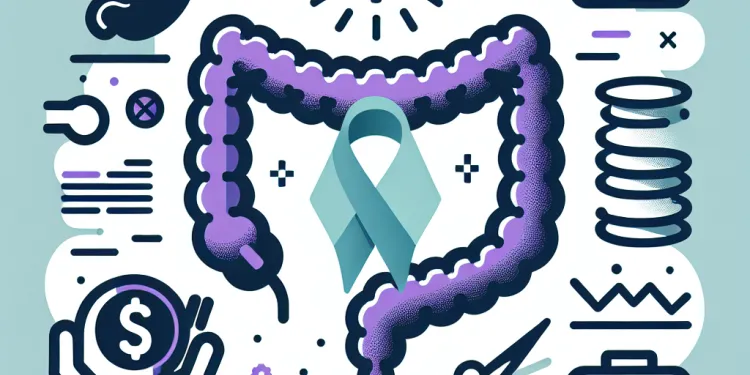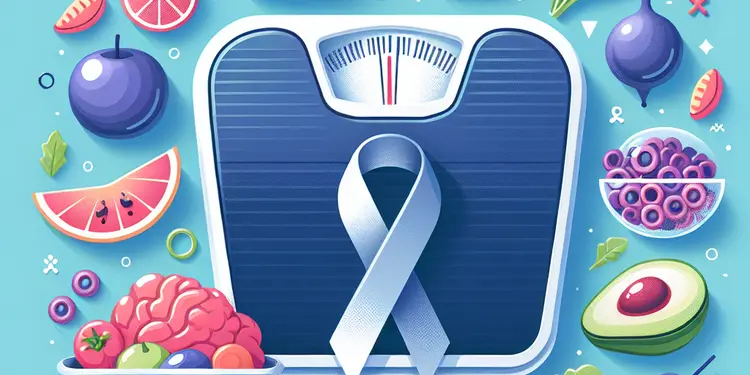Find Help
More Items From Ergsy search
-

Taking a Genetic Family History - The Conversation (Bowel Cancer)
Relevance: 100%
-

How does family history affect the risk of bowel cancer?
Relevance: 83%
-

How common is bowel cancer?
Relevance: 59%
-

Should people with a family history of colorectal cancer take aspirin?
Relevance: 58%
-

What are the risk factors for bowel cancer?
Relevance: 58%
-

Can bowel cancer be prevented?
Relevance: 58%
-

What is Bowel Cancer?
Relevance: 58%
-

Why is there a surge in bowel cancer?
Relevance: 57%
-

What factors are contributing to the increase in bowel cancer cases?
Relevance: 56%
-

Are younger people being diagnosed with bowel cancer more frequently?
Relevance: 55%
-

Is genetic testing available for colorectal cancer?
Relevance: 54%
-

How is bowel cancer diagnosed?
Relevance: 54%
-

Is genetic screening available for cancer risk?
Relevance: 51%
-

Bowel cancer - Symptoms and signs to look out for
Relevance: 51%
-

Learn about bowel cancer (British Sign Language version)
Relevance: 49%
-

What treatment options are available for bowel cancer?
Relevance: 49%
-

What is the survival rate for bowel cancer?
Relevance: 48%
-

What support is available for individuals diagnosed with bowel cancer?
Relevance: 47%
-

Is diet linked to the rise in bowel cancer?
Relevance: 46%
-

Can bowel cancer spread to other parts of the body?
Relevance: 45%
-

How does obesity affect bowel cancer rates?
Relevance: 44%
-

Bowel cancer screening: Alan Titchmarsh and Tommy Walsh | NHS
Relevance: 44%
-

What role does alcohol consumption play in bowel cancer risk?
Relevance: 44%
-

Bowel Cancer
Relevance: 43%
-

What is colorectal cancer?
Relevance: 43%
-

How does exercise impact bowel cancer progression?
Relevance: 43%
-

How is the stage of bowel cancer determined?
Relevance: 43%
-

What factors increase my risk of colorectal cancer?
Relevance: 42%
-

What are the side effects of bowel cancer treatment?
Relevance: 42%
-

What lifestyle changes can help lower the risk of bowel cancer?
Relevance: 41%
-

Are there specific benefits of exercise for bowel cancer survivors?
Relevance: 41%
-

What is the difference between colon cancer and rectal cancer?
Relevance: 41%
-

How to do the FIT bowel cancer screening test | Cancer Research UK
Relevance: 40%
-

What are the recommendations for colorectal cancer screening?
Relevance: 40%
-

How does increased screening impact bowel cancer statistics?
Relevance: 40%
-

Can lifestyle changes help reduce bowel cancer risk?
Relevance: 40%
-

What types of exercise are beneficial for bowel cancer patients?
Relevance: 39%
-

Can exercise help slow down the progression of bowel cancer?
Relevance: 39%
-

Can exercise help slow down the progression of bowel cancer?
Relevance: 39%
-

What role does diet play in the risk of developing bowel cancer?
Relevance: 39%
Genetics and Bowel cancer
Bowel cancer, also known as colorectal cancer, can have genetic components. While most cases of bowel cancer are sporadic, meaning they occur by chance and are not directly inherited, about 5-10% of cases have a hereditary component.
Hereditary conditions and bowel cancer
There are several hereditary conditions associated with an increased risk of developing bowel cancer, including:
- Familial adenomatous polyposis (FAP): This is a rare genetic condition caused by mutations in the APC gene. People with FAP develop hundreds or thousands of polyps in the lining of their colon and rectum, usually starting in their teens or twenties. Without treatment, FAP almost always leads to colorectal cancer.
- Lynch syndrome (also known as hereditary non-polyposis colorectal cancer or HNPCC): This is the most common inherited form of colorectal cancer, accounting for about 3-5% of cases. Lynch syndrome is caused by mutations in genes involved in DNA mismatch repair, such as MLH1, MSH2, MSH6, and PMS2. Individuals with Lynch syndrome have a significantly increased risk of developing colorectal cancer, as well as other cancers including endometrial, ovarian, stomach, small intestine, urinary tract, and others.
- MUTYH-associated polyposis (MAP): This condition is caused by mutations in the MUTYH gene and is associated with an increased risk of developing multiple colorectal polyps and cancer.
- Other rare hereditary syndromes: There are several other rare genetic conditions associated with an increased risk of colorectal cancer, including Peutz-Jeghers syndrome, juvenile polyposis syndrome, and Cowden syndrome, among others.
In addition to these specific genetic syndromes, having a family history of colorectal cancer (especially if it's diagnosed at a young age or if multiple family members are affected) can also increase an individual's risk of developing the disease, although the specific genetic factors involved may not always be known.
It's important for individuals with a family history of bowel cancer or any of these hereditary conditions to undergo genetic counseling and testing, as well as regular screening for colorectal cancer, to help detect and manage their risk. Early detection through screening can significantly improve outcomes for individuals at high risk of developing colorectal cancer.
Taking a Genetic Family History - The Conversation (Bowel Cancer)
Introduction to Genetic Family History
Taking a genetic family history is an integral step in understanding an individual’s risk of developing certain medical conditions, such as bowel cancer. In the United Kingdom, bowel cancer is a significant health concern, with genetic factors playing a crucial role in its development. Understanding the genetic predisposition through family history can aid in early detection, prevention, and tailored treatment strategies.Identifying At-Risk Individuals
A thorough genetic family history involves collecting detailed information about the health of immediate and extended family members. For bowel cancer, ask about the incidence of bowel or colorectal cancer and related conditions such as polyps. It’s essential to gather details going back at least three generations, noting the age of diagnosis to assess early-onset cases, which may indicate a hereditary cancer syndrome like Lynch syndrome or Familial Adenomatous Polyposis (FAP).Essential Questions to Ask
During the conversation, ask specific questions to uncover relevant genetic information:- Has anyone in your family had bowel cancer? If so, at what age were they diagnosed?
- Are there any records of colorectal polyps, and at what age were they detected?
- Have any relatives been diagnosed with other related cancers, such as endometrial or ovarian cancer?
- Is there a known presence of genetic syndromes such as Lynch syndrome, FAP, or other hereditary cancer syndromes in your family?
Interpreting the Data
Analyze the collected family history to identify patterns that may suggest a hereditary risk of bowel cancer. Families with multiple cases of bowel cancer, especially at young ages, may benefit from genetic counselling and testing. Referral to a specialist in clinical genetics may be advisable to perform genetic tests, such as testing for mutations in the MLH1, MSH2, or APC genes, which are commonly associated with hereditary bowel cancer.Implications for Prevention and Screening
For individuals identified at high genetic risk, heightened surveillance through regular screening is crucial. In the UK, those with a significant family history may start screening colonoscopies at an earlier age and follow a more frequent screening schedule than the general population. Additionally, genetic counselling can provide risk-reducing strategies, including lifestyle modifications and possible prophylactic interventions.Concluding Thoughts
Taking a genetic family history is a fundamental approach in managing bowel cancer risk. By identifying genetically predisposed individuals, healthcare providers can offer personalized screening and prevention plans, ultimately enhancing patient outcomes. For individuals and families in the UK, being proactive in discussing and documenting their family health history is a vital step towards mitigating the risk of bowel cancer.Genetics and Bowel Cancer
Bowel cancer is sometimes called colorectal cancer. It happens when cells in the bowel grow in an uncontrolled way. Most of the time, bowel cancer happens by chance. But in some people, it can run in families because of genes. This means about 5-10% of cases are inherited.
Hereditary Conditions and Bowel Cancer
Some genetic conditions can increase the chance of getting bowel cancer. These conditions include:
- Familial Adenomatous Polyposis (FAP): This is a rare genetic condition. It happens because of changes in the APC gene. People with FAP can get many growths called polyps in their bowel. These polyps usually start in their teenage or twenties. Without treatment, FAP almost always leads to bowel cancer.
- Lynch Syndrome: This is the most common inherited cause of bowel cancer. It affects 3-5% of people with the disease. Lynch syndrome is caused by changes in specific genes that fix DNA mistakes. People with this condition have a higher chance of getting bowel cancer and other cancers, like womb, stomach, and more.
- MUTYH-Associated Polyposis (MAP): Changes in the MUTYH gene cause this condition. It increases the risk of getting many polyps and bowel cancer.
- Other Rare Syndromes: Other rare genetic conditions can also increase the chance of bowel cancer. These include Peutz-Jeghers syndrome, juvenile polyposis syndrome, and Cowden syndrome.
Having family members with bowel cancer, especially if they got it young or if many family members have it, can also increase someone's risk. Sometimes, the exact genes are not known.
If someone has a family history of bowel cancer or these genetic conditions, they should see a genetic counselor. They might need genetic testing to check their risk. Regular check-ups and screening tests can help find bowel cancer early. Finding cancer early can make treatments work better and help people stay healthy.
Taking a Family Health History - Talking About Bowel Cancer
What is a Family Health History?
Taking a family health history means finding out about illnesses that run in your family. This helps doctors know if you might get certain illnesses, like bowel cancer. In the UK, bowel cancer is a big health worry. Your family’s health can tell if you might need to be extra careful.Finding People Who Might Get Bowel Cancer
To know who might get bowel cancer, you need to ask about your family’s health. This includes your close and not-so-close family members. Ask if anyone had bowel cancer or related problems. It helps to know about the health of your family for at least three generations (your parents, grandparents, and sometimes great-grandparents). Knowing when family members got sick is important. It can show if the risk is in your family because of something called Lynch syndrome or Familial Adenomatous Polyposis (FAP).Important Questions to Ask
Here are some questions you can ask to learn about your family’s health:- Did anyone in our family have bowel cancer? How old were they when they found out?
- Did anyone have lumps in their bowels called polyps? When did they get them?
- Has anyone in the family had other cancers, like cancer of the womb or ovaries?
- Is there any known family history of specific syndromes like Lynch syndrome or FAP?
Understanding the Information
Look at your family health information to see if bowel cancer runs in the family. If many family members had bowel cancer, especially when they were young, you might get genetic counselling and tests. These tests look for changes in genes (like MLH1, MSH2, or APC) that might mean a higher risk of cancer.Prevention and Screening Plans
If you are at high risk because of your family history, you can start getting checked (screening) for cancer earlier. In the UK, you might have checks like colonoscopies sooner and more often if your family had a lot of cancer cases. Talking to a genetic counsellor can help with strategies to stay healthy.Final Thoughts
Knowing your family’s health history helps you and your doctor make plans to prevent or catch bowel cancer early. By talking about and writing down your family’s health, you can take important steps to stay healthy.Frequently Asked Questions
What is a genetic family history?
A genetic family history involves gathering information about the health and medical history of your relatives, specifically focusing on conditions like bowel cancer.
Why is it important to take a genetic family history for bowel cancer?
Taking a genetic family history helps assess your risk of bowel cancer and other hereditary conditions. It can guide potential screening and preventive measures.
Who should be included in a genetic family history for bowel cancer?
Include first-degree relatives (parents, siblings, and children), second-degree relatives (grandparents, aunts, uncles, nieces, and nephews), and third-degree relatives (cousins).
How can I collect my family's medical history?
You can collect the history by speaking directly with your relatives, asking them about any diagnoses of bowel cancer, ages at diagnosis, and any other relevant health issues.
What specific information should I ask my relatives about?
Ask about any incidences of bowel cancer, polyps, ages at diagnosis, and any genetic test results that might be relevant.
What are the signs of a hereditary bowel cancer syndrome?
Red flags include multiple family members with bowel cancer, early onset of bowel cancer (before age 50), and relatives with multiple types of cancers.
Can genetic testing determine my risk for bowel cancer?
Genetic testing can identify specific mutations that increase your risk for bowel cancer. It is usually recommended if your family history suggests a hereditary cancer syndrome.
What is the NHS policy on genetic testing for bowel cancer?
The NHS provides genetic testing for individuals with a significant family history of bowel cancer, often through a referral from a GP or specialist.
How does knowing my genetic risk impact my healthcare?
Knowing your genetic risk allows for personalized screening plans, early detection, and preventive measures, which can significantly improve outcomes.
What lifestyle changes can reduce my risk of bowel cancer?
Lifestyle changes such as maintaining a healthy diet, exercising regularly, avoiding smoking, and limiting alcohol consumption can help reduce your risk.
How frequently should I be screened for bowel cancer?
Screening recommendations vary based on risk. Generally, individuals at higher genetic risk may need more frequent and earlier screening compared to the general population.
Are there any support groups for families affected by hereditary bowel cancer?
Yes, there are several support groups and organizations in the UK, such as Bowel Cancer UK, which offer support and resources for affected families.
What treatment options are available if I am diagnosed with bowel cancer?
Treatment options depend on the stage of cancer and may include surgery, chemotherapy, radiotherapy, targeted therapy, and immunotherapy.
How can I discuss my family history with my GP or specialist?
Bring a detailed family history to your appointment and ask specific questions about your risk and appropriate screening measures.
Is my privacy protected when sharing my genetic information?
Yes, in the UK, genetic and medical information is protected under data protection laws, ensuring your privacy and confidentiality.
What is a genetic family history?
A genetic family history is like a family tree but for your health. It is about the health of your family members. It can show health problems that might run in the family.
Tools or Techniques to Help:
- Draw a simple picture of your family tree.
- Ask family members about their health.
- Write down what you learn to share with your doctor.
A genetic family history is when you find out about the health of your family. You look at things like if anyone had bowel cancer.
Why is it important to know your family's health history for bowel cancer?
Knowing about your family's health history can help you understand your own health. If someone in your family had bowel cancer, you might have a higher chance of getting it too. This means doctors can watch your health more closely.
Here are some ways to keep track of your family's health:
- Ask your family about any health problems they have had.
- Make a list of any relatives who had cancer and tell your doctor.
- If you need help, ask the doctor to explain things more clearly.
By doing this, you and your doctor can take steps to keep you healthy.
Learning about your family's health history can help you understand your risk for bowel cancer and other health problems. This can help you and your doctor decide if you need special tests or steps to stay healthy.
Who should be part of a family's health history for bowel cancer?
It is important to know which family members might have had bowel cancer. This can help doctors understand your risk of getting it. Here are some people to include:
- Your parents (Mum and Dad)
- Your brothers and sisters
- Your children
- Your grandparents
- Your aunts and uncles
- Your cousins
To make this easier, you can:
- Ask family members about their health history
- Write down what you find out
- Use simple charts or drawings to keep track
Taking notes can help you remember the important details.
Think about your family. This means your mum, dad, brothers, sisters, and children. It also means your grandparents, aunts, uncles, nieces, and nephews. And don't forget your cousins too!
How can I collect my family's medical history?
Here is a simple way to gather your family's health information:
- Talk to your family: Ask your parents, grandparents, and other relatives about any health problems they have or had.
- Write it down: Use a notebook or computer to keep a list of any illnesses or health issues they mention.
- Ask questions: Find out the ages when they got sick and any treatments they had.
- Stay organized: Use charts or lists to keep the information clear.
Helpful tip: Use a voice recorder or ask someone to help you write if you find it hard to take notes.
You can ask your family about their health. Talk to them about any bowel cancer in the family. Ask when they found out they had it and if they have any other important health problems.
What should I ask my family about?
Here is how you can ask your family for help:
- Ask about family history. You can ask about past events and important family stories.
- Find out about family health. Ask if there are any health problems that run in the family.
- Ask about family traditions. Learn about special holidays or things your family does together.
Tools that might help you:
- Use pictures to help remember stories.
- Record your family stories with a phone or tape recorder so you can listen again.
- Write down what you learn in a special notebook.
Ask if anyone in your family has had bowel cancer or polyps. Find out how old they were when the doctor said they had it. Also, ask if there are any important test results about genes.
What are the signs of bowel cancer that can run in families?
Bowel cancer can sometimes run in families. Here are some signs to look out for:
- A family member had bowel cancer, especially if they were young.
- People in the family have had lots of small growths (called polyps) in their bowel.
- There are other types of cancer in close family members, like stomach or womb cancer.
Remember to talk to a doctor if you are worried. They can help and answer questions.
Watch out for warning signs like:
- Many people in the family having bowel cancer.
- Someone getting bowel cancer before they turn 50.
- Family members having different kinds of cancers.
If any of these sound familiar, it might help to talk to a doctor.
Some things that can help:
- Ask a friend or family member to help remember details.
- Write down questions to ask the doctor.
- Use pictures or diagrams to understand better.
Can tests show if I might get bowel cancer?
Doctors can look at your genes to see if you might get bowel cancer. This is called genetic testing.
Genes are like little instructions inside your body. They tell your body how to work.
If people in your family have had bowel cancer, you might have a higher risk.
Talk to your doctor about genetic testing if you are worried about bowel cancer.
Someone can help you understand the test results.
Genetic tests can find changes in your genes that might make you more likely to get bowel cancer. Doctors usually suggest these tests if your family has a history of cancer that can be passed down through genes.
What does the NHS say about testing for bowel cancer genes?
The NHS has rules about testing for genes that can cause bowel cancer. “Genes” are directions in our bodies that decide how we grow and stay healthy.
Finding out about these genes can help doctors know if someone might get bowel cancer.
To learn about your genes, the NHS might give you a special test. This test looks at your genes to see if they have changes that could cause cancer.
Doctors use what they learn from the test to help you stay healthy.
If you want to know more or need help, you can:
- Talk to your doctor or nurse. They can explain things in a way that’s easy to understand.
- Bring a friend or family member to your appointments for support and to help you remember information.
- Use pictures or videos to help you learn about genes and tests.
The NHS can do genetic tests if lots of people in your family have had bowel cancer. You usually need to see your doctor or a specialist first and they will send you to get the test.
How can knowing my genes help with my healthcare?
Knowing your genetic risk can help. It means doctors can check you in a special way, find problems early, and help stop them from happening. This can make things better for you.
How can I change my lifestyle to lower my bowel cancer risk?
Bowel cancer is a sickness. It is also called colon cancer. Here are some tips to stay healthy and help lower your risk:
- Eat Healthy: Try to eat fruits, vegetables, and whole grains. These foods are good for you.
- Exercise: Move your body every day. Walking, playing, and dancing are good exercises.
- Don't Smoke: Smoking is bad for your health. Try not to smoke.
- Avoid Too Much Alcohol: Drinking too much alcohol is not good. Try to drink less.
- Keep a Healthy Weight: Try to stay at a healthy weight. Eating healthy and exercising can help.
It can help to talk to your doctor. They can give you more ideas and support.
You can stay healthy by eating good food, exercising, not smoking, and drinking less alcohol. These things can help keep you safe.
How often should I get tested for bowel cancer?
You should get checked for bowel cancer every 2 years if you are 50 or older. If you are younger but have family members with bowel cancer, ask your doctor how often to get tested.
To help you remember when to get tested, you can:
- Use a calendar to mark the next test date.
- Set reminders on your phone.
- Tell a family member to remind you.
How often you need to be checked depends on your risk. People with a higher risk because of their genes might need to get checked more often and start sooner than most people.
Is there help for families with inherited bowel cancer?
Families with inherited bowel cancer can find help in support groups. These are groups where people meet to talk and help each other.
Families can share their stories and learn from others. This can make it easier to feel understood and supported.
Try looking online to find these groups. You can ask your doctor or nurse too. They might know where you can get support.
Yes, there are many groups in the UK that can help. One group is Bowel Cancer UK. They give support and help to families who need it.
What can I do if I have bowel cancer?
If the doctor says you have bowel cancer, there are things that can help you. These are called treatments.
- Surgery: A doctor might do an operation to take out the bad part of the bowel.
- Chemo: You might take medicine that helps to kill cancer cells.
- Radiotherapy: This uses powerful rays to make cancer cells smaller.
If you find this information hard to read, you can ask someone to help you. It's also okay to ask the doctor lots of questions.
How to treat cancer depends on how far it has grown. Doctors might do surgery to take out the cancer. They could use special medicine like chemotherapy to kill cancer cells. They might use strong beams, called radiotherapy, to get rid of cancer. Some treatments, called targeted therapy, go after the cancer cells only. Another way is immunotherapy, which helps your body fight the cancer. It's a good idea to talk with your doctor about what is best for you. You can also use pictures or videos to help understand more about these treatments.
How can I talk about my family history with my doctor?
Here is how you can talk to your doctor about your family's health:
- Write down what you know about your family's health. This could be any illnesses your family members have had.
- Make a list of questions you want to ask your doctor.
- Bring someone with you to the visit. They can help you remember what the doctor says.
- Use pictures or drawings to explain things if that helps you.
- If you need help understanding, tell your doctor. They can explain things in a simpler way.
It is okay to ask the doctor to repeat things. You can also ask them to write things down for you.
When you go to your doctor, bring a list of illnesses in your family. Ask the doctor about your health risks and any tests you might need.
Is my private information safe when I share my genes?
When you share your genes, people want to know if their private stuff is safe.
Here are some ways to make sure your information stays safe:
- Ask questions: Before sharing, ask how your information will be used.
- Read agreements: Look at the rules on how they use your information.
- Secure passwords: Use a strong and unique password to protect your accounts.
If you need help, ask a friend or family member to look at it with you.
Yes, in the UK, there are rules that keep your genetic and medical information safe and private. These rules protect your privacy.
Useful Links
This website offers general information and is not a substitute for professional advice.
Always seek guidance from qualified professionals.
If you have any medical concerns or need urgent help, contact a healthcare professional or emergency services immediately.
- Ergsy carfully checks the information in the videos we provide here.
- Videos shown by Youtube after a video has completed, have NOT been reviewed by ERGSY.
- To view, click the arrow in centre of video.
- Most of the videos you find here will have subtitles and/or closed captions available.
- You may need to turn these on, and choose your preferred language.
- Go to the video you'd like to watch.
- If closed captions (CC) are available, settings will be visible on the bottom right of the video player.
- To turn on Captions, click settings .
- To turn off Captions, click settings again.
More Items From Ergsy search
-

Taking a Genetic Family History - The Conversation (Bowel Cancer)
Relevance: 100%
-

How does family history affect the risk of bowel cancer?
Relevance: 83%
-

How common is bowel cancer?
Relevance: 59%
-

Should people with a family history of colorectal cancer take aspirin?
Relevance: 58%
-

What are the risk factors for bowel cancer?
Relevance: 58%
-

Can bowel cancer be prevented?
Relevance: 58%
-

What is Bowel Cancer?
Relevance: 58%
-

Why is there a surge in bowel cancer?
Relevance: 57%
-

What factors are contributing to the increase in bowel cancer cases?
Relevance: 56%
-

Are younger people being diagnosed with bowel cancer more frequently?
Relevance: 55%
-

Is genetic testing available for colorectal cancer?
Relevance: 54%
-

How is bowel cancer diagnosed?
Relevance: 54%
-

Is genetic screening available for cancer risk?
Relevance: 51%
-

Bowel cancer - Symptoms and signs to look out for
Relevance: 51%
-

Learn about bowel cancer (British Sign Language version)
Relevance: 49%
-

What treatment options are available for bowel cancer?
Relevance: 49%
-

What is the survival rate for bowel cancer?
Relevance: 48%
-

What support is available for individuals diagnosed with bowel cancer?
Relevance: 47%
-

Is diet linked to the rise in bowel cancer?
Relevance: 46%
-

Can bowel cancer spread to other parts of the body?
Relevance: 45%
-

How does obesity affect bowel cancer rates?
Relevance: 44%
-

Bowel cancer screening: Alan Titchmarsh and Tommy Walsh | NHS
Relevance: 44%
-

What role does alcohol consumption play in bowel cancer risk?
Relevance: 44%
-

Bowel Cancer
Relevance: 43%
-

What is colorectal cancer?
Relevance: 43%
-

How does exercise impact bowel cancer progression?
Relevance: 43%
-

How is the stage of bowel cancer determined?
Relevance: 43%
-

What factors increase my risk of colorectal cancer?
Relevance: 42%
-

What are the side effects of bowel cancer treatment?
Relevance: 42%
-

What lifestyle changes can help lower the risk of bowel cancer?
Relevance: 41%
-

Are there specific benefits of exercise for bowel cancer survivors?
Relevance: 41%
-

What is the difference between colon cancer and rectal cancer?
Relevance: 41%
-

How to do the FIT bowel cancer screening test | Cancer Research UK
Relevance: 40%
-

What are the recommendations for colorectal cancer screening?
Relevance: 40%
-

How does increased screening impact bowel cancer statistics?
Relevance: 40%
-

Can lifestyle changes help reduce bowel cancer risk?
Relevance: 40%
-

What types of exercise are beneficial for bowel cancer patients?
Relevance: 39%
-

Can exercise help slow down the progression of bowel cancer?
Relevance: 39%
-

Can exercise help slow down the progression of bowel cancer?
Relevance: 39%
-

What role does diet play in the risk of developing bowel cancer?
Relevance: 39%


